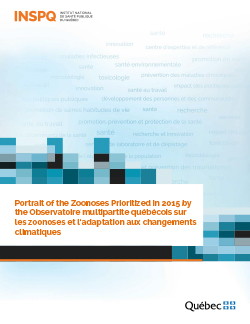Portrait of zoonoses prioritized by Quebec’s observatory on zoonoses and climate change adaptation in 2015
- In Québec, like elsewhere in the world, diseases that can be transmitted from animals to humans (zoonoses), which account for about 60% of diseases communicable to humans, are currently emerging. The complex dynamics of zoonoses can be affected by climate change. In response to this complexity, the Observatoire initiated a zoonosis prioritization approach in 2015 in the context of climate change. This approach allowed it to develop a portrait of zoonoses that will serve as the basis for documenting their evolving situations in Québec, in an effort to anticipate potential issues of concern. Documenting the zoonoses also allowed it to better identify the challenges and knowledge gaps specific to the prioritized zoonoses, thereby serving as a tool to direct and optimize zoonosis research, surveillance, prevention and control activities. Twelve zoonoses were prioritized: food-borne botulism in Nunavik, campylobacteriosis, cryptosporidiosis, eastern equine encephalitis, verotoxigenic Escherichia coli, Q fever, giardiasis, avian and swine influenza, Lyme disease, rabies, salmonellosis, and West Nile virus.
- The prioritized zoonoses are documented in the form of a fact sheet for each of them, in a standardized data summary format, thus making this information more easily accessible to those using this report. The following information is presented for each zoonosis: number of human infection cases in Québec; disease burden in public health and animal health; transmission potential of the pathogen in question; link(s) to climate change; surveillance or early detection measures in Québec; prevention and control measures in Québec; other potential surveillance, prevention and control measures (elsewhere or recommended); and, lastly, associated knowledge gaps and challenges. The zoonosis documentation approach took place in two steps: (1) producing content for the fact sheets by synthesizing information derived from different sources (scientific articles, government reports, dissertations and theses); and (2) having experts validate and enrich the content, following an iterative process.
- This exercise revealed the following main finding: given the current state of scientific knowledge, evidence-based data on the impact of climate change on zoonoses remain limited. This main finding deserves further consideration and refinement by the Observatoire.


